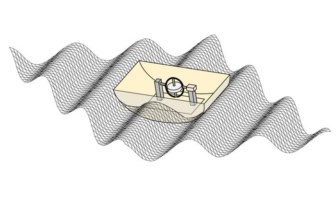Zahra Hussaini is a senior software reliability engineer (SRE) at Waymo, an autonomous driving technology company that started as Google’s Self-Driving Car Project. Prior to Waymo, she was a Google Search SRE, a satellite imagery software engineer, and a research assistant at the National Institute of Standards and Technology. She graduated with BS degrees in physics and mathematics from Arizona State University in 2013.

What skills do you use every day in your job?
Most of my job is collaborative problem solving. SREs are software engineers that focus on the overall reliability and performance of large software systems, and we work in close collaboration with the software engineering teams that built them. I model and reason about software in the same way that I was taught to think about the natural world in my physics classes. Sometimes, this involves reading code and predicting how a scenario will play out from first principles. Other times, it’s about designing and running experiments to measure how a system behaves under extreme conditions. Whatever the method, the goal is to find the edges of what the system can do and develop project ideas for how to expand its capabilities.
Technical communication is another job skill that I practised during my physics education. I’m rarely working on a problem alone, which means I need to be able to talk about complex problems and their potentially complex solutions simply and succinctly. When I’m writing project plans, I have to be clear about the assumptions and approximations I’m making; and to clearly describe the logical steps I took to reach a conclusion.
In addition to doing project work, SRE team members share the responsibility of dealing with software outages in real-time. My team runs exercises where we simulate outage scenarios and practise our responses. This part of the job combines diligently preparing for emergencies with quick, creative thinking.
What do you like best and least about your job?
What I like most about my job is the people that I work with. A healthy team culture is essential for every other part of the job. We do better work when people feel safe asking questions and sharing ideas. We build more reliable systems when we view mistakes and failures as an opportunity to learn rather than to blame. It’s important to me (and to Waymo) that we build a culture that makes it easy for people to do their best work because our mission is big. We’re working on autonomous driving technology that has the potential to transform lives.
My least favourite thing is that I don’t get to feel like an expert as much as I’d like. SREs have a lot of breadth because we’re a cross-functional team that works with many different software engineering teams. It’s common to get projects that require getting up to speed in a new area quickly. It’s easy to slip into feeling like I am incompetent and always playing catch up since I’m never done learning. I have to remind myself that this is a normal part of the job, and I have to balance my desire to understand everything with the need to get things done.
What do you know today, that you wish you knew when you were starting out in your career?
I wish I knew that it was okay to be lost. When I was younger, I felt like I needed certainty and a clear direction if I wanted to achieve anything worthwhile in my career. I wrote and rewrote 10-year plans, trying to find my future. I didn’t have exposure to physics career options other than academia, so getting a PhD was an unwavering fixture of my many plans. For years, I suppressed signs telling me that a research career wasn’t for me, hoping that I could find a way to stick to the plan. When I did finally decide to leave for a career in the tech industry, I had a profound feeling that I had failed. This wasn’t true of course, but it took me a while to realize that and to let go of my rigid planning mentality.
I wish I knew that it was okay to explore, that there are many different paths to happiness, and that you can be good at things without them being the right thing for you. These days, my career plan has three words: follow your curiosity.
- This article was first published in the APS Careers guide 2023.



